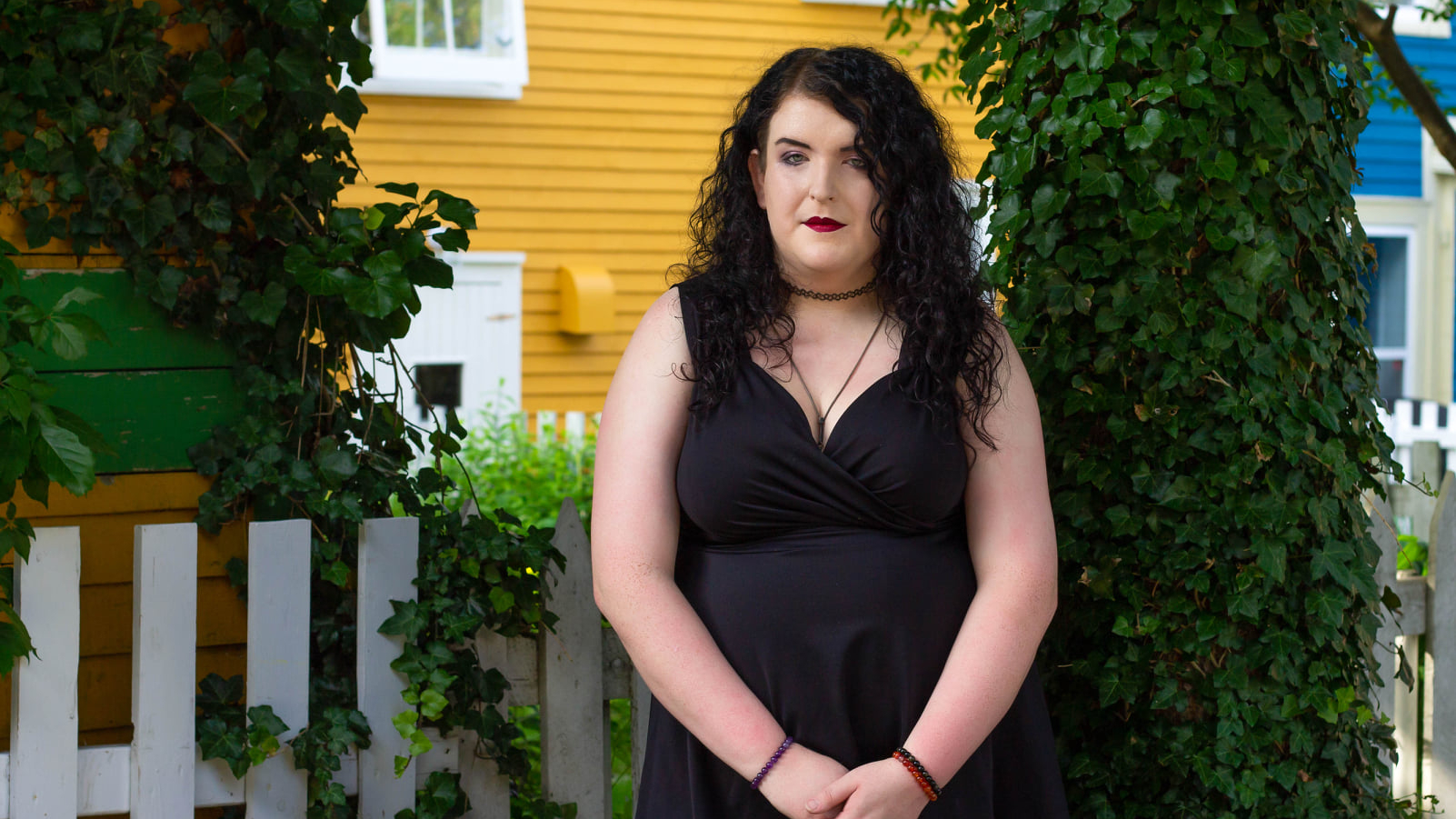Content warning: This story contains discussion of transphobic harassment.
“One of my partners purchased a fucking purple and black flogger during the campaign with the express intention of using it in one of the ads,” Ophelia Ravencroft tells me over a Zoom call. That set the tone for much of our interview.
As a goth non-binary trans lesbian, Ravencroft isn’t what you might expect from a first-term city councillor. Her iconic purple and black lawn signs festooned downtown St. John’s, Newfoundland and Labrador, ahead of the city’s municipal election on Sep. 28—though she didn’t manage to feature the matching flogger in any of her ads.
Ravencroft is the first trans person elected to city council in St. John’s, the first openly non-binary person elected in Newfoundland and Labrador and the second openly trans city councillor elected in the province after Charlotte Gauthier was elected in Gillams.
This year has seen an historic increase in LGBTQ2S+ political representation in Canada at municipal, provincial and federal levels. High-profile examples include Lisa Lachance as Nova Scotia’s first genderqueer MLA and “Mx. Deputy Speaker” and Blake Desjarles’s election as the first openly Two-Spirit MP.
Ravencroft spoke to Xtra about her past in feminist activism, the core issues facing her ward and the harassment she faced during her campaign.
Congratulations on your election to council. How’s it been since you’ve been sworn in?
One of the previous councillors speaking to me before I ran for the position said, “About 50 percent of people are emailing you and asking about parking.” And that has been true. The ward that I represent has a lot of issues with on-street parking and people that don’t have driveways and pedestrian issues and so on, a lot of which is actually why I ran.
Honestly, the staff have been wonderful. I think the rest of council has been incredibly kind. And there’s a lot of strong progressive voices who I think are really going to make some good things happen.
Are you the first openly goth person to be elected to city council in St. John’s?
Yes! To the best of my knowledge, I am the first openly—or clandestine—goth person to have served on St. John’s City Council, or for that matter anywhere in the province.
You identify as non-binary, as a trans woman and a lesbian. What do those identities mean to you?
I knew I was a girl when I was four. In terms of the non-binary piece, that was actually a reflection that came during our first COVID-19 lockdown last year. I realized I had an extremely strong connection to womanhood and femininity, but I didn’t feel that that was in accordance with any cis-normative sense of what that meant. It was a relationship between myself and that identity category that was intensely personal. Very frequently, I didn’t feel connected, I actually felt quite aggressively disconnected and quite uncomfortable with some of the standards that have been placed on me. My sense of my gender is very specific to me, and very personal. In terms of being a lesbian, I have loved one man. I’m attracted to femmes, I don’t think I care so much how those femmes identify.
You were elected to represent Ward 2 of St. John’s specifically. Can you tell me about the area and the issues you’re focused on for your constituents?
The ward that I represent is predominantly what people understand to be the city’s downtown. I think it’s the second youngest ward, and also one of the wards with the most diversity in terms of age and place of origin. There’s a remarkable sense of vibrancy, which is part of what I appreciate. It’s also been my home for a long time. We have a relatively high percentage of rental units in the area. There are large swathes of the ward that don’t really have effective parking for anybody in their homes. So a lot of folks that live here don’t drive, and I don’t. I’ve never had a driving licence in my life.
“My sense of my gender is very specific to me, and very personal.”
We have a bus system in the city that is not overly adequate, that is quite underpowered and could use a revamp in terms of its service model and its frequency of service. We have really serious issues in the city with pedestrianism in the winter in particular. As you know, we get a lot of snow in the winter here, and we don’t clear it off all the sidewalks effectively. Even now for me as a pedestrian, I can kind of get around in the winter, but it’s tough. If you have accessibility needs it’s impossible. Combine that with improper public transit and infrastructure for accessibility that could really use improvement.
We have some issues here with affordable housing as well, which is obviously a thing everywhere. But we certainly are seeing the issue here, particularly either accessible housing and much more than that, adequate housing. The affordable stuff that’s here could use some improvements—let’s put it that way.
What was your background before you ran for City Council?
I’ve spent years as a feminist activist locally, particularly anything to do with sex worker rights. I’ve been a paid employee with our city’s sex worker support program, Safe Harbour Outreach Project, so that was kind of my entry into it.
I was a PhD student for quite some time. I went to the university here, working on a doctorate in ethnomusicology about gender equity in the local heavy metal community. My background is fairly odd for somebody in this position, but I think I can make it work.
You ran for City Council in 2020 and narrowly lost. What made you run again?
I came in second in that election in a field of eight candidates, which was really obviously disappointing, but incredibly affirming.
How I phrased it at the time was, either I win this in 2020 and then I’m running again next year as an incumbent, or I have a really long campaign next year. And I had a really long campaign for this year. Within the eight people that had run in that by-election [in 2020], I was by far walking into it as the one with the lowest public profile. I was a relative unknown, and somebody who had struggled to gain traction in a lot of spheres. Sadly, this is the reality of being trans in a place that has a certain amount of conservatism when it comes to issues of gender and sexuality.
What do you mean by “conservatism when it comes to issues of gender and sexuality?”
There are areas of the province that are strongly evangelical, that have some fairly conservative pastors in particular who have a disproportionate influence—the conventional kind of boilerplate evangelical bigotry. But it’s almost unusual to see it brought to the surface. The things that are said to you in the street, the kind of harassment that you experience, some of what I saw when I got during the campaign, for instance… it can be quite rough.
The harassment you faced during your campaign ended up making the news. Can you tell me a bit about it?
I spent two months facing some of that stuff through emails and social media. People turned up at my work, my mother’s house, my campaign manager’s house and so on. We faced an awful lot of shit. But when it got to the point where I thought, okay, well, I have to go to the police now because there is a man here threatening to kill me and everyone that I work with and a bunch of other trans people at random because we’re animals and we deserve to die—something is going to need to be done. My manager drafted a statement, I put it out. It was rough. It was demoralizing. But it was also proof of why I was doing this. Because when you meet resistance like that, this is something we need to be prepared to strike down.
“To see this many people prepared to put themselves in the line of fire and say that they would defend me was remarkable.”
People say to you, “When you enter into politics, you expect harassment, you’re in the public eye now and that’s something you have to expect.” It’s not something you should have to expect. I know to an extent that I could be putting myself at risk a little bit by getting involved in this. But I hope anybody who’s reading this can look at the results of this election, and look at the way that so many members of the public sprung up in support, who were inclined to stand with us and say, “No, we think this is wrong.” Let that be the thing that defines us.
I still periodically get stopped in the street. But recently the streetside conversations have been quite positive. It’s been very sort of, “This is wrong, what they’re doing to you. I don’t want this to represent our place, I don’t want you to think this is what Newfoundlanders are like.” We see ourselves, rightly or wrongly, as being a very friendly and warm and welcoming place. But the reality is not always like that, unfortunately. So to see this many people prepared to very vocally stand up and put themselves in the line of fire and say that they would defend me, and anybody else who was going through this, was remarkable.
Your election website says “good governments should amplify the voices of their most vulnerable citizens.” Who do you feel has traditionally been left out of municipal issues in St. John’s?
I think 2017 was the first time we had anyone on council who was openly queer, let alone trans. You’re going to wind up unfortunately with a lot of voices that do get left out. That’s the same thing BIPOC folks—particularly the urban Indigenous population here—have experienced. Anyone who lives below the poverty line. New Canadians in particular are left out because permanent residents don’t have the right to vote in municipal elections here. [Editor’s note: only Canadian citizens are allowed to vote in all levels of elections across Canada.] Groups that we see underrepresented everywhere, we see underrepresented here. Whether you’re queer, you’re racialized, or even women—goodness, we have relative gender parity on council now, but in 2013, we elected an all-male council.
I am the first [openly] non-binary person to serve anywhere in the province, as far as I know. It’s about time that council discussions were more reflective, not just of diversity or opinion and lived experience, but also that representation [on council] was radically improved.
What message do you want to pass on to young queer, trans and non-binary people in St. John’s?
Paraphrasing RBG [former Supreme Court Justice Ruth Bader Ginsburg], there will be enough of us to fill the place up. In any capacity, in any governmental body, there will be enough of us to fill the place up. I think if I could say anything, it would be: “Y’all are the smartest fucking people I’ve ever met.” Sincerely, we are such a brilliant fucking community. And we share a diversity of lived experience that so many other folks could never dream of experiencing. I want to encourage as many of you as I can to understand that there is space for you in any institution that you want to be a part of, and you belong there.
Interview has been edited for length and clarity.
Correction: November 5, 2021 2:18 pmThis story has been updated to correct the attribution of a paraphrased quote.


 Why you can trust Xtra
Why you can trust Xtra


